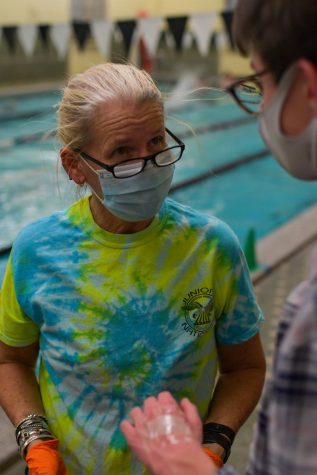A case of Chronic coaching: Swim coach and paramedic pushes others to succeed
December 16, 2021

Day or night, Coach Kate Chronic does what she does best, what she looks forward to doing each and every day: coaching.
While the sun’s still out, she works as operations supervisor for a downtown Medical Express Ambulance Services garage, coaching and overseeing paramedics working in the field. After the sun sets, Coach Chronic heads to Hyde Park for a different sort of coaching: leading swim practices for students from Lab and schools all over the South Side through M3 Aquatics.
In both her day and night jobs, Coach Chronic pushes others to do things beyond their comfort zone and to take pride in their successes.
When Coach Chronic moved to Chicago in 2013, she also moved away from a career in clinical psychology. But she found that she missed working in a medical setting, so she decided to train to be an emergency medical technician at Malcolm X College. She later returned for a year of paramedic training.
Throughout all of her training and her start as a paramedic, Coach Chronic continued to dedicate herself as a swim coach. When her commitments to both careers began to conflict with each other, Coach Chronic took on her current job at Medical Express Ambulance Services, where she helps paramedics prepare the ambulances and advises them throughout the work day. It’s a job with hours that accommodate her swim coaching.
While her double work day may seem overwhelming to an outsider, Coach Chronic said that she sees both careers not as work, but rather as part of her identity as a coach.
“I look at coaching as more of a lifestyle,” Coach Chronic said, “so no matter what arena I’m in, it’s just kind of who I am, so it makes it easy.”
She said her job overseeing a garage with around 20 ambulances had a new degree of challenge throughout the past two years of the pandemic, due to rigorous protocols put in place to prevent the spread of the virus.
When a deadly virus could board the ambulance alongside each patient, working on the front lines of the pandemic puts the paramedics in danger as well.
“Our first inclination is to help and to do something,” Coach Chronic said. “And yet at the same time, the very people that you want to help are the people carrying the thing that could kill you.”
Whether in the garage or by the pool, Coach Chronic hopes she can push her trainees to decide to take risks and try new and difficult things, and then help them follow through.
And, in either setting, Coach Chronic hopes the young people she coaches take away
“a sense of empowerment and sense of confidence that they accomplish something that they didn’t ever think they could do, or had not thought that they could do prior to being on the team.”
Coach Chronic has two sides as a swim coach: the one who pushes her team to succeed during practices, and the one who, according to U-High senior Jennifer Huo, offered to give her swimmers rides if they ever felt in danger, no questions asked.
“She’s very strict at times, but she genuinely cares,” Jennifer said.
Even after stepping into a larger role as a swim coach in founding M3 Aquatics when U-High students couldn’t hold practices during the pandemic, and even after dealing with the stress of working in emergency medical services during a world-wide medical crisis, Coach Chronic’s love for coaching never faltered.
“I always said, long ago, if I ever stopped waking up and being thrilled to death to go to work every day, it was time for me to change careers,” Coach Chronic said. “I’ve been coaching for probably 30 plus years now, and have yet to wake up a day and not look forward to practice or not work.”






























































